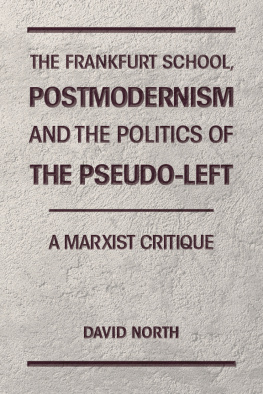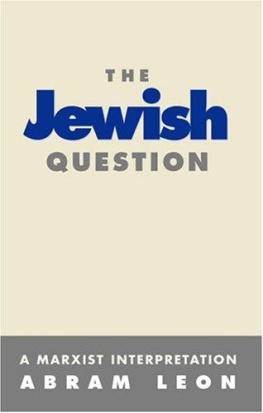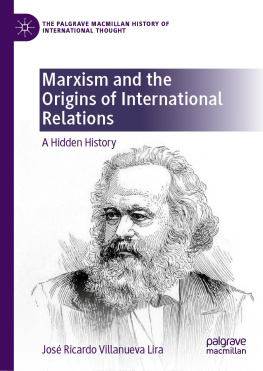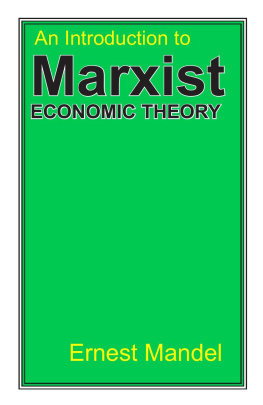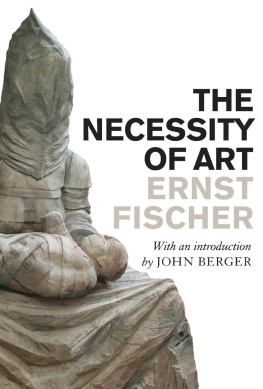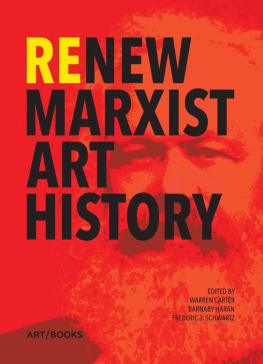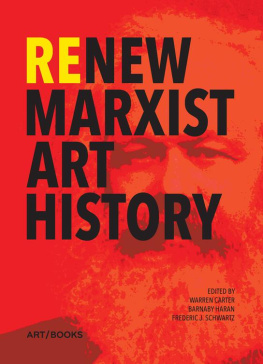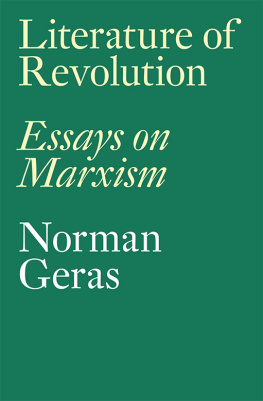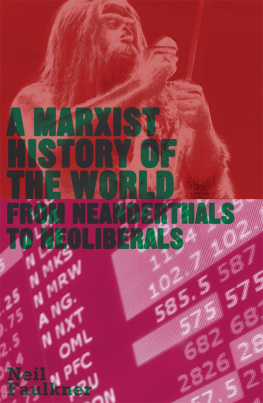Introduction
Benjamin Zachariah
Lutz Raphael
Brigitta Bernet
Revisiting Marxian thinking today is beset with a striking contradiction. It was long expected of Karl Marx by Marxists, especially those of a party-political persuasion, that he be a transhistorical prophet. At the same time, Marxian thinking has made much use of history, situating itself firmly in what it understood as historical context. Historians engagement with Marxian thinking is by now inseparable from the discipline of history itself, because arguments with and within Marxism were intimately connected with historical thinking since the mid-nineteenth century, and perhaps more so as a consequence of the Cold War, when Marxist, non-Marxist and anti-Marxist accounts of history all had a tendency to be mutually dependent caricatures of themselves and of one other. After the Cold War, the quick retreat of Marxian thinking in academic systems led to a curious scenario: history survived as a discipline with many of its debates disavowing their origins and intellectual underpinnings. Later readers had to contend with the equivalent of eavesdropping on one side of a telephone conversation and having to guess what was being said on the other side.
A Return to Marx, or the Rediscovery of Lost Debates and Forgotten Answers
Two 1950s science fiction accounts come to mind in connection with this. The first is the Foundation Trilogy by Isaac Asimov, a Russian-Jewish immigrant in the United States, whose account of psychohistory, with its laws of prediction of history, made him suspicious to the House Committee on Un-American Activities in the United States (psychohistory, in Asimovs account, is a Jewish conspiracy of Freudian-Marxist prediction). Asimovs implied critique of mechanistic notions of predictable historical trajectories could easily be overlooked: the Mule, a figure intended to invoke the Third Reich and Adolf Hitler, clearly interrupts the progress of psychohistory that its founder, Hari Seldon, had envisaged. The second account, A Canticle for Leibowitz, by Walter Miller Jr, is one in which, after the inevitable nuclear holocaust, all of human knowledge had to be reconstructed painstakingly from the shopping list of a man called Leibowitz. The first can be taken as a metonymy for the promises and failings of Marxian thinking in history; the second, as a metaphor for the loss of knowledge and its slow recovery, and although we are not quite in this unfortunate latter position, it needs to be said that what the historical profession once knew of Marxism is not the common knowledge it once was; nor can historians rely on working with a background in Marxian thinking, which they can choose to deploy in novel and unpredictable ways (or, indeed, in mechanistic or Stalinist ways). The task of this volume has been, in many ways, to revisit former frameworks as part of a collective relearning process, as well as to revisit those frameworks from the perspective of new research and a new set of problems, to ask the question: whats left of Marxism that can be still considered useful to the historical profession?
We can leave aside the larger question of whether there is still one historical profession or a set of at best similar professions pretending to be part of a scholarly unit today, or whether we have ceased to speak to one another, for one of the premises of a volume such as this is that we can make that attempt to speak to one another. In accordance with this principle, we have made no attempt to coordinate approaches, to set the parameters of what contributors ought to address, or to attempt anything like completeness of thematic or geographical coverage. Nor have we picked fights among ourselves or with others, despite the undeniably entertaining side of the Marxian heritage of polemics. What we are concerned with is to open out a period of fruitful and renewed communication, and the distance kept here from strong disagreement is in the interest of future disagreement on substantive issues.
Even a cursory glance at the contents of this volume, however, indicates a few important points. Firstly, the claim that Marxism is inherently Eurocentric (a claim, it must be added, made mostly by those with little acquaintance with Marxs own writings, or with those of Marxian thinkers more generally) has been historically, and is today, a load of old cobblers. We use the term Marxian here by way of contrast with Marxist, the first indicating a softer tendency to draw on ideas from Marx or a Marxist tradition, the second a harder (and more organised, sometimes party-political) tendency, though the dividing line between the two is hardly a hard one. Marxian ways of thinking about history have been, and continue to be, influential in studying historical change in disparate parts of the world, across chronological periods and geographies, and it is possible to maintain a comparative framework precisely because Marxian ways of thinking comprise not merely evaluative terms but also explicit criteria for what they evaluate (thereby giving one the opportunity to dissent or re-evaluate). Non-Europeans, notoriously, refused to accept the (European?) judgement on the Eurocentrism of Marxism or Marxian thinking, and continued to try and develop it.
Secondly, if one is not invested in a literal-minded reading of Marxian received wisdom, and historical stages do not need to follow one another in exactly the same way across the world, there is much to be gained from trying to understand the dynamic of changes in modes of production and relations of production and from changing relationships of people to work. Breaking up the linearity of a conventional Western Marxism (which is a curious polemic, given that within European debates, Western Marxism and Eastern or Soviet Marxism are distinct entities), or not subscribing to Eurocentric ideas of steps or stages of social formation, are desirable goals, but the entities that we claim to be breaking up turn out mostly to be straw figures, if we look more closely at them.
Thirdly, following from that, we are not restricted to, or by, the recovery and rereading of earlier debates in order to recapture their subtleties and contexts, but if we are willing to accept that analogy and historical parallel, when not used as blunt instruments, can yield insights into other contexts, the recoveries are not merely pedantic and academic. And fourthly, there has been a habit of conflating the programmatic texts of Marxism with Marxian historical texts and Marxist-influenced historical studies, to the detriment of them all, thereby missing Marxs point that his provisional judgements were, in his own assessment, to be rewritten in the light of detailed historical study.
A productive rediscovery of Marxian thinking as a critical resource for the present depends on re-historicising and thus simultaneously re-politicising it. At the beginning of the 1960s, Jean Paul-Sartre described Marxism, then still very much a part of mainstream social and political thinking, as the impassable horizon of thought of his time: as part of an overall process of social questioning and self-reflection. At the same time he pointed out that all thinking, including and especially philosophical thinking, is historically situated.


